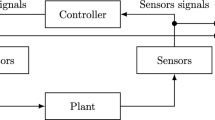Abstract
The long-term objective is to evaluate the dynamic reliability of mechatronic systems. We propose in this paper a new version of the algorithm that allows deriving critical scenarios from a Petri net model. It is more accurate because it takes into account some continuous aspects of the system. These scenarios characterise how the system leaves the normal operation to go to the feared state by determining the sequences of actions and state changes leading to a dangerous situations.
Access this chapter
Tax calculation will be finalised at checkout
Purchases are for personal use only
Preview
Unable to display preview. Download preview PDF.
Similar content being viewed by others
References
Lee, W. S.; Grosh, D. L.; Tillman, F. A., Lie, C. H., «Fault tree analysis, methods, and applications — A review », IEEE Transactions on Reliability, August 1, 1985; ISSN 0018-9529; r-34, page 194-203.
Chris J. Garret, Sergio B. Guarro, George E. APOSTOLAKIS, «The Dynamic Flowgraph Methodology for Assessing the Dependability of Embedded Software Systems », IEEE Transactions On Systems, Man, and Cybernetics, Vol. 25, No. 5, May 1995.
F. Dufour, Y. Dutuit, “Dynamic Reliability: A new model”, λμ13-ESREL2002 European Coférence, Lyon-France-18 au 21 Mars 2002.
P.E. Labeau: “A Survey on Monte Carlo Estimation of Small Failure Risks in Dynamic Reliability”. In International Journal of Electronics and Communications, Vol. 52, pp. 205–211, 1998.
R. Champagnat, P. Esteban, H. Pingaud, R. Valette, “Modelling and simulation of a hybrid system through PrITr PN DAE model”, ADPM’98 3rd International Conference on Automation of Mixed Processes, 19-20 March 1998, Reims, France p. 131–137.
H. Demmou, S. Khalfaoui, N. Rivière, E. Guilhem, “Extracting critical scenarios from a Petri net model using linear logic” Journal
S. Khalfaoui, H. Demmou, E. Guilhem, R. Valette “An algorithm for deriving critical scenarios in mechatronic systems” IEEE SMC (System Man and Cybernetic”2002, 6-9 October, Hammamet Tunisie
J.Y Girard, “Linear Logic”, Theoretical Computer Science, 50, 1987, p. 1–102.
B. Pradin-Chézalviel, R. Valette, L.A. Künzle: Scenario duration characterization of t-timed Petri nets using linear logic, IEEE PNPM’99, 8th International Workshop on Petri Nets and Performance Models, Zaragoza, Spain, September 6-10, 1999, p.208–217.
S. Khalfaoui, E.Guilhem, H. Demmou, R. Valette, “Une méthode pour obtenir des scénarios critiques dans les systèmes mécatroniques”, λμ13-ESREL2002 European Conférence, Lyon-France-18 au 21 mars 2002.
Author information
Authors and Affiliations
Editor information
Editors and Affiliations
Rights and permissions
Copyright information
© 2004 Springer-Verlag London
About this paper
Cite this paper
Medjoudj, M., Khalfaoui, S., Demmou, H., Valette, R. (2004). A Method for Deriving Feared Scenarios in Hybrid Systems. In: Spitzer, C., Schmocker, U., Dang, V.N. (eds) Probabilistic Safety Assessment and Management. Springer, London. https://doi.org/10.1007/978-0-85729-410-4_300
Download citation
DOI: https://doi.org/10.1007/978-0-85729-410-4_300
Publisher Name: Springer, London
Print ISBN: 978-1-4471-1057-6
Online ISBN: 978-0-85729-410-4
eBook Packages: Springer Book Archive




